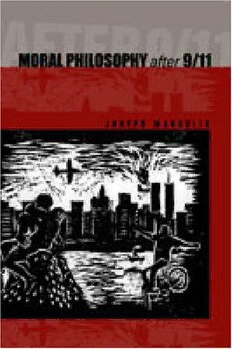
Moral Philosophy After 9 11 PDF
169 Pages·2004·1.717 MB·English
Most books are stored in the elastic cloud where traffic is expensive. For this reason, we have a limit on daily download.
Preview Moral Philosophy After 9 11
Description:
Were the perpetrators of the 9/11 attacks courageous "freedom fighters" or despicable terrorist murderers? These opposing characterizations reveal in extreme form the incompatibility between different moral visions that underlie many conflicts in the world today, conflicts that challenge us to consider how moral disputes may be resolved. Eschewing the resort to universal moral principles favored by traditional Anglo-American analytic philosophy, Joseph Margolis sets out to sketch an alternative approach that accepts the lack of any neutral ground or privileged normative perspective for deciding moral disputes. This "second-best" morality, nevertheless, aspires to achieve an "objectively" valid resolution through a dialectical procedure of reasoning toward a modus vivendi, an accommodation of prudential interests that are rooted in the customs and practices of the societies in conflict. In working out this approach, Margolis engages with a wide range of thinkers, from Plato, Aristotle, Kant, and Hegel through Nietzsche, Heidegger, Levinas, Rawls, Habermas, MacIntyre, Rorty, and Nussbaum, and his argument is enlivened by reference to many specific moral issues such as abortion, the control of Kashmir, and the continuing struggle between the Muslim world and the West.
See more
The list of books you might like
Most books are stored in the elastic cloud where traffic is expensive. For this reason, we have a limit on daily download.
